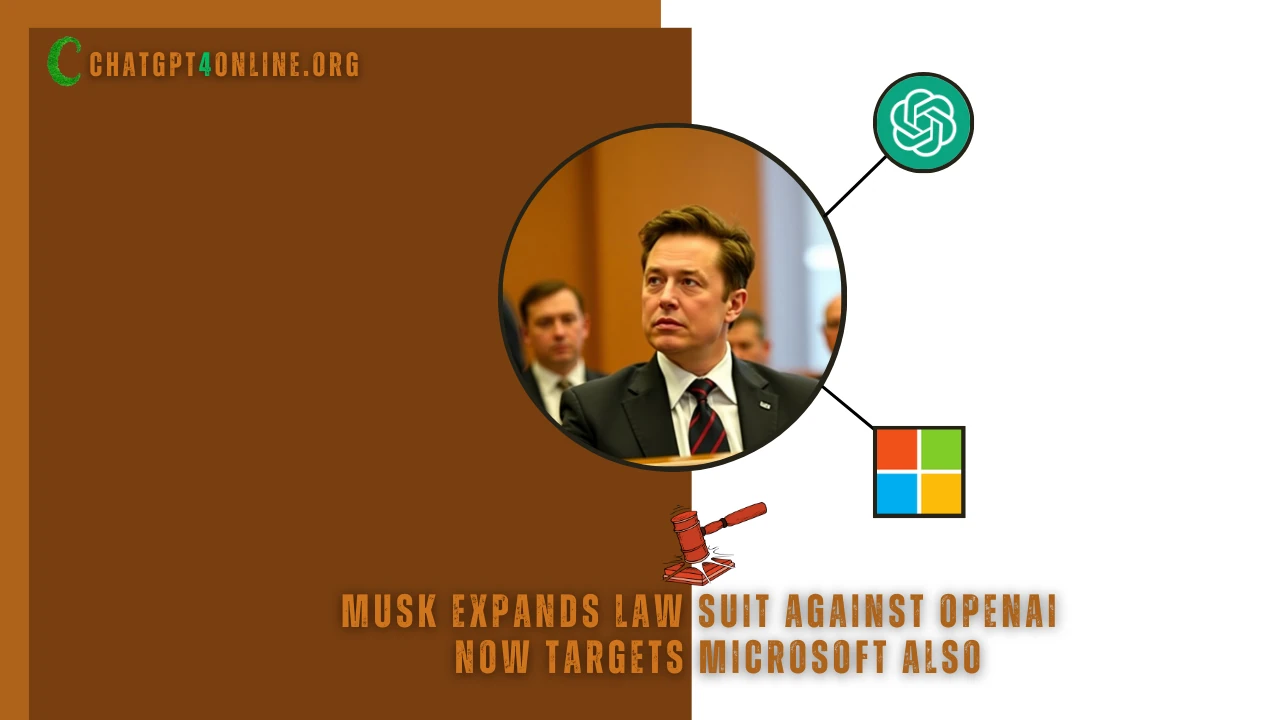Musk Expands Lawsuit Against OpenAI, Targets Microsoft Also
Elon Musk has amended his lawsuit against OpenAI to include Microsoft, alleging monopolistic practices and ethical breaches in the rapidly evolving AI landscape.
He says OpenAI, a company he co-founded in 2015 but parted ways with in 2018, with the collaboration of Microsoft has diverted from its original mission of serving humanity with AI and is turning into a for-profit company.
Tesla CEO Elon Musk expanded his lawsuit against ChatGPT maker, initially filed in February, to include Microsoft and its board member Reid Hoffman as defendants. I’ll dig deep into the reasons behind Musk’s lawsuit against OpenAI and Microsoft.

Why Elon Musk is Suing OpenAI
OpenAI was established with the mission of developing artificial general intelligence (AGI) in a way that benefits humanity. Initially structured as a non-profit, it turned in 2019 to a “capped profit” model to attract investment, which led to a $13 billion funding deal with Microsoft.
Musk, a vocal critic of this transition, argued that OpenAI’s partnership with Microsoft signaled a departure from its founding principles, prioritizing profits over transparency and societal benefit.
Musk claims that OpenAI has become less “open” and more aligned with corporate interests. He has expressed particular concern over Microsoft’s dominant role, which includes exclusive access to OpenAI technologies such as GPT models.
This relationship, Musk says, has given Microsoft unfair competitive advantages while undermining OpenAI’s original mission. Musk’s lawyer Marc Toberoff said: “Musk is determined to remedy the abuse of the OpenAI charity he co-founded and is adamant as to the need for immediate decisive action.”
Discover also when OpenAI is going to launch Autonomous AI Agents.
Why Elon Musk is Suing Microsoft
In November 2024, Musk filed an amended lawsuit in California, adding Microsoft as a defendant alongside OpenAI and its CEO Sam Altman. The lawsuit accuses OpenAI of violating its foundational agreements and Microsoft of engaging in monopolistic behavior.
Elon Musk, Donald Trump‘s adviser, asserts that these actions have suppressed competition, particularly harming his own AI startup, xAI, which is also a plaintiff in the case.
Microsoft’s multibillion-dollar financial backing of OpenAI indicates its strategic interest in controlling and commercializing AI technologies. This partnership strengthens Microsoft’s position in the AI landscape, especially in competition with other tech giants like Google and Amazon.
The Federal Trade Commission (FTC), which investigates major tech companies for potential antitrust violations, is investigating Microsoft’s substantial investment in OpenAI. The concern is whether this partnership unfairly stifles competition or consolidates market power in a way that disadvantages rivals and consumers.
Tesla CEO Elon Musk’s growing prominence within President-elect Donald Trump’s administration places him in a position to potentially shape U.S. government policies, including those related to antitrust enforcement and AI development. Musk’s influence could affect decisions about regulatory frameworks and oversight in these areas.
Key Allegations in Musk Lawsuit Against OpenAI
How OpenAI Responds to Musk’s Lawsuit
OpenAI claims that Elon Musk tried to gain control of the organization and proposed merging it with Tesla, his electric car company. This suggests Musk wanted to integrate OpenAI’s cutting-edge AI technology into Tesla’s operations, possibly to bolster Tesla’s capabilities in AI-driven systems, such as autonomous driving.
OpenAI has requested that the court dismiss Musk’s latest lawsuit. OpenAI’s spokesperson, Jason Deutrom, criticized Musk’s legal efforts as “baseless and overreaching,” implying that OpenAI views the lawsuits as lacking merit or factual support.
OpenAI has recently launched ChatGPT Search which has more advanced search capabilities.
Final Thoughts
OpenAI began as a nonprofit with the mission of developing AI technology that benefits humanity. Nonprofit status places limitations on revenue generation and the ability to attract large-scale investment because profits must be reinvested into the organization rather than distributed to investors
OpenAI and its CEO Sam Altman aim to transition into a structure, such as a “capped profit” or fully conventional company model, to attract more private investment by offering financial returns, reducing or eliminating oversight from its nonprofit board, providing greater autonomy in decision-making, and positioning itself as a commercially viable entity to compete effectively in the tech space.
This lawsuit is not merely a corporate dispute but a clash over the ethical governance of AI. Musk’s arguments center on whether companies like OpenAI can retain their foundational goals while engaging with for-profit entities.
The case could set precedents regarding AI development, corporate transparency, and antitrust regulations in tech.
AI Tools
AI Marketing Tools
AI Business Tools
Albert Haley
Albert Haley, the enthusiastic author and visionary behind ChatGPT 4 Online, is deeply fueled by his love for everything related to artificial intelligence (AI). Possessing a unique talent for simplifying complex AI concepts, he is devoted to helping readers of varying expertise levels, whether newcomers or seasoned professionals, in navigating the fascinating realm of AI. Albert ensures that readers consistently have access to the latest and most pertinent AI updates, tools, and valuable insights. Author Bio

